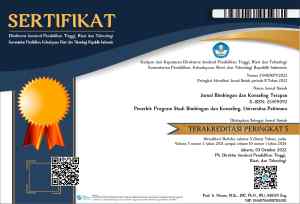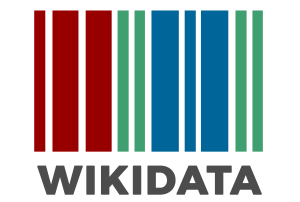- Focus and Scope
- Section Policies
- Peer Review Process
- Publication Frequency
- Open Access Policy
- Archiving
- Publication Ethics
- Screening Plagiarism
- Digital Archiving
Focus and Scope
Types of Articles Accepted:
- Research Paper: Empirical studies presenting original research in the field of guidance and counseling.
- Conceptual Paper or Literature Review: This includes systematic literature reviews, bibliometric analyses, and meta-analyses, providing comprehensive overviews of specific topics within the domain.
Focus Areas and Topics:
1. Application of Counseling and Psychotherapy:
- In-depth exploration of various counseling approaches and techniques.
- Insight into the practical aspects of implementing these approaches in real-world settings.
2. Application of Psychoeducational Group and/or Classical Guidance:
- Studies or reviews focusing on the use of psychoeducational groups in guidance and counseling.
- Analysis of classical guidance methods and their effectiveness in contemporary contexts.
3. Application of Assessment in Guidance and Counseling:
- Examination of various assessment tools and methodologies in guidance and counseling.
- Discussion on the role of assessment in developing effective counseling strategies.
4. Application of Guidance and Counseling Services:
- Papers discussing the implementation of guidance and counseling services in various settings (schools, colleges, community centers, etc.).
- Analysis of the impact and effectiveness of these services.
5. Application in Other Contexts Relevant to the Scientific Development of Guidance and Counseling:
- Articles exploring innovative applications or new contexts for guidance and counseling.
- Contributions to the broader scientific and theoretical development of the field.
These points provide a comprehensive overview of the submission criteria and thematic focus areas for "Jurnal Bimbingan dan Konseling Terapan," guiding potential authors in preparing their manuscripts for submission.
Section Policies
Front & Back Matter
Research Paper
Conceptual Paper / Literatur Review
Statements of Retraction
No Section
Peer Review Process
Jurnal Bimbingan dan Konseling Terapan is a double blind peer-reviewed Journal. This means that both the reviewer and author identities are concealed from the reviewers, and vice versa, throughout the review process. To facilitate this, authors need to ensure that their manuscripts are prepared in a way that does not give away clues to the authors’ identity. Citations that may reveal the authors’ identities (e.g., “in an extension of our previous work [citation of work with authors’ names]”) should be masked (e.g., [“Authors, 2011”]). The authors’ names, positions or titles, places of employment, and mailing addresses should appear on one cover Title Page only, not in an author footnote. Other subsequent pages should include only the manuscript title in the header.
Submitted papers are evaluated by anonymous referees for contribution, originality, and relevance. Reviewer selection is critical to the publication process, and we base our choice on many factors, including expertise, reputation, specific recommendations and our own previous experience of a reviewer's characteristics. We check with potential reviewers before sending them manuscripts to review. Reviewers reserves the right to reject the script if the script review didn't match to the fields/expertise. Reviewers should bear in mind that all correspondeces in this journal contain confidential information, which should be treated as such. In general, we need one month to inform you about the results. Totally, peer review process estimated time consuming up to three months.
Publication Frequency
Since 2017 the journal has been published regularly two times a year (January and July).
Open Access Policy
This journal provides immediate open access to its content on the principle that making research freely available to the public supports a greater global exchange of knowledge.
Archiving
This journal utilizes the LOCKSS system to create a distributed archiving system among participating libraries and permits those libraries to create permanent archives of the journal for purposes of preservation and restoration. More...
Publication Ethics
Duties of Authors | |
| 1 | Reporting Standars: |
| Authors of reports of original research should present an accurate account of the work performed as well as an objective discussion of its significance. Underlying data should be represented accurately in the paper. A paper should contain sufficient detail and references to permit others to replicate the work. Fraudulent or knowingly inaccurate statements constitute unethical behaviour and are unacceptable. | |
| 2 | Data Access and Retention: |
| Authors may be asked to provide the raw data in connection with a paper for editorial review. They should be prepared to provide such data within reasonable time. | |
| 3 | Originality and Plagiaris: |
| The authors should ensure that they have written entirely original works, and if the authors have used the work and/or words of others that this has been appropriately cited or quoted. | |
| 4 | Multiple, Redundant or Concurrent Publication: |
| An author should not in general publish manuscripts describing essentially the same research in more than one journal or primary publication. Submitting the same manuscript to more than one journal concurrently constitutes unethical publishing behaviour and is unacceptable. | |
| 5 | Acknowledgement of Sources: |
| Proper acknowledgment of the work of others must always be given. Authors should cite publications that have been influential in determining the nature of the reported work. | |
| 6 | Authorship of the Paper: |
| Authorship should be limited to those who have made a significant contribution to the conception, design, execution, or interpretation of the reported study. All those who have made significant contributions should be listed as co-authors. Where there are others who have participated in certain substantive aspects of the research project, they should be acknowledged or listed as contributors. The corresponding author should ensure that all appropriate co-authors and no inappropriate co-authors are included on the paper, and that all co-authors have seen and approved the final version of the paper and have agreed to its submission for publication. | |
| 7 | Disclosure and Conflicts of Interest: |
| All authors should disclose in their manuscript any financial or other substantive conflict of interest that might be construed to influence the results or interpretation of their manuscript. All sources of financial support for the project should be disclosed. | |
| 8 | Fundamental errors in published works: |
| When an author discovers a significant error or inaccuracy in his/her own published work, it is the author’s obligation to promptly notify the journal editor or publisher and cooperate with the editor to retract or correct the paper. | |
| 9 | Hazards and Human or Animal Subjects: |
| If the work involves chemicals, procedures or equipment that have any unusual hazards inherent in their use, the author must clearly identify these in the manuscript. | |
| Duties of Editors | |
| 1 | Fair Play: |
| An editor at any time evaluate manuscripts for their intellectual content without regard to race, gender, sexual orientation, religious belief, ethnic origin, citizenship, or political philosophy of the authors. | |
| 2 | Confidentiality: The editor and any editorial staff must not disclose any information about a submitted manuscript to anyone other than the corresponding author, reviewers, potential reviewers, other editorial advisers, and the publisher, as appropriate. |
| 3 | Disclosure and Conflicts of Interest: |
| Unpublished materials disclosed in a submitted manuscript must not be used in an editor's own research without the express written consent of the author. | |
| 4 | Publication Decisions: |
| The editor board journal are responsible for deciding which of the articles submitted to the journal should be published. The validation of the work in question and its importance to researchers and readers must always drive such decisions. The editors may be guided by the policies of the journal's editorial board and constrained by such legal requirements as shall then be in force regarding libel, copyright infringement and plagiarism. The editors may confer with other editors or reviewers in making this decision. | |
| 5 | Review of Manuscripts: |
| Editor must ensure that each manuscript is initially evaluated by the editor for originality. The editor should organize and use peer review fairly and wisely. Editors should explain their peer review processes in the information for authors and also indicate which parts of the journal are peer reviewed. Editor should use appropriate peer reviewers for papers that are considered for publication by selecting people with sufficient expertise and avoiding those with conflicts of interest. | |
| Duties of Reviewers | |
| 1 | Contribution to Editorial Decisions: |
| Peer review assists the editor in making editorial decisions and through the editorial communications with the author may also assist the author in improving the paper. | |
| 2 | Promptness: |
| Any selected referee who feels unqualified to review the research reported in a manuscript or knows that its prompt review will be impossible should notify the editor and excuse himself from the review process | |
| 3 | Standards of Objectivity: |
| Reviews should be conducted objectively. Personal criticism of the author is inappropriate. Referees should express their views clearly with supporting arguments. | |
| 4 | Confidentiality: |
| Any manuscripts received for review must be treated as confidential documents. They must not be shown to or discussed with others except as authorized by the editor. | |
| 5 | Disclosure and Conflict of Interest: |
| Privileged information or ideas obtained through peer review must be kept confidential and not used for personal advantage. Reviewers should not consider manuscripts in which they have conflicts of interest resulting from competitive, collaborative, or other relationships or connections with any of the authors, companies, or institutions connected to the papers. | |
| 6 | Acknowledgement of Sources: |
| Reviewers should identify relevant published work that has not been cited by the authors. Any statement that an observation, derivation, or argument had been previously reported should be accompanied by the relevant citation. A reviewer should also call to the editor's attention any substantial similarity or overlap between the manuscript under consideration and any other published paper of which they have personal knowledge. | |
Screening Plagiarism
Plagiarism screening will be conducted by Jurnal Bimbingan dan Konseling Editorial Board using Grammarly® Plagiarism Checker and CrossCheck plagiarism screening service powered by iThenticate.
Digital Archiving
To ensure the continuity of data article that has been published to be accessible to everyone, the editor took the policy of every issue of Jurnal Bimbingan dan Konseling Terapan for doing digital archiving at the National Library of Republic of Indonesia. The manuscript has been published each issue delivered to the national library as much as two copies and OAI. Each Member of the National Library of the Republic of Indonesia (Perpusnas RI) and has had a number of legitimate members, has the right to make use of our online digital collection write-up (e-Resources).
To become a member of Perpusnas RI, please do registration online via http://keanggotaan.perpusnas.go.id, or by visiting the Perpusnas in service building at Jalan Salemba Raya 28 Jakarta Pusat or Jalan Merdeka Selatan 11 Jakarta Pusat.
All-digital Journal content is stored on a secure server who is backed up frequently. In the event of a problem, the back-up will be restored within 24 hours. Jurnal Bimbingan dan Konseling Terapan also implementing PKP Private LOCKSS Network (PLN) preservation function.


















